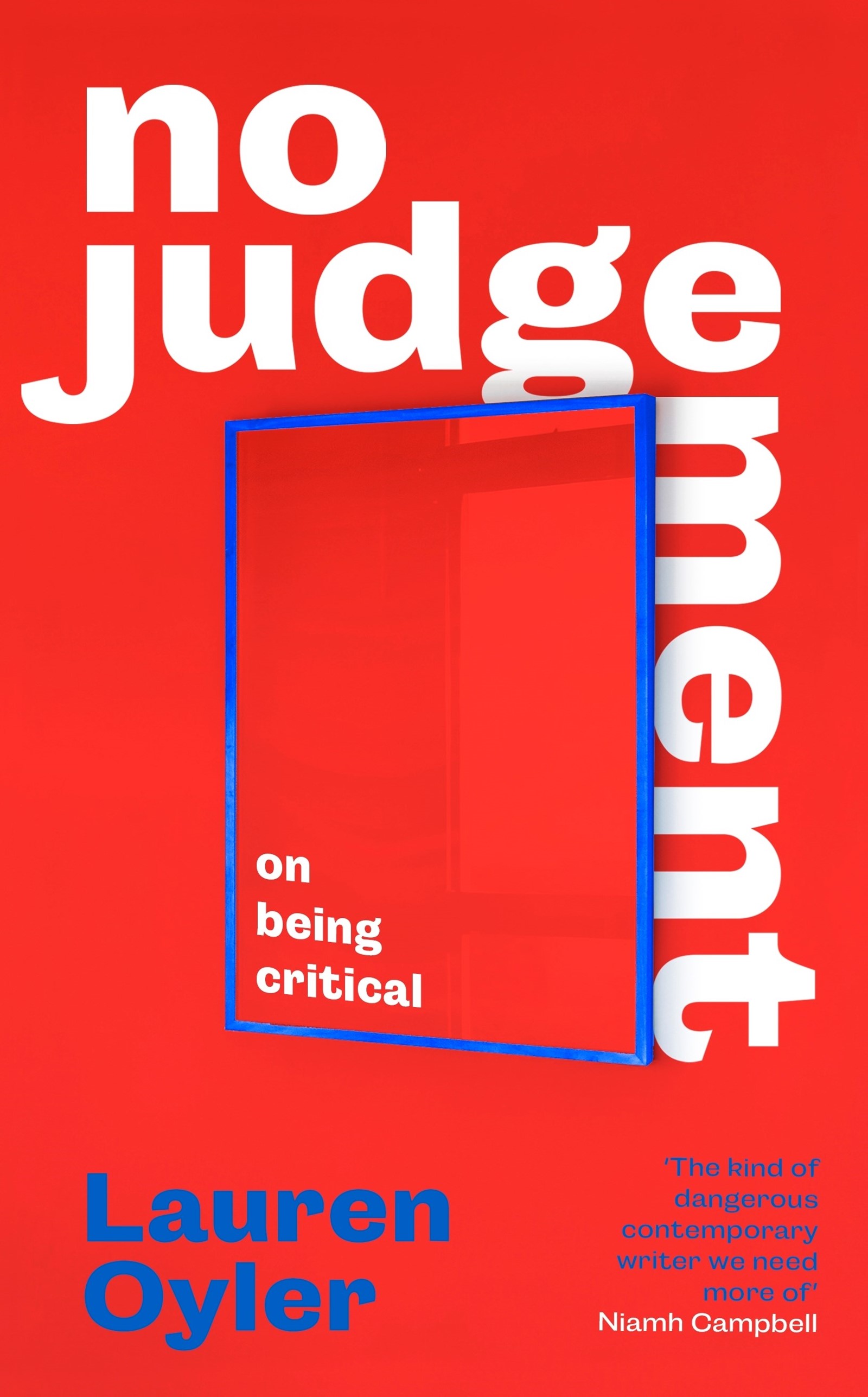Cultural criticism is in a state of crisis – a perennial concern, as Lauren Oyler argues in her new essay collection, No Judgement: On Being Critical, but one which feels particularly acute in the current moment: rarely a month goes by without an arts publication closing down, and the critics who do remain in employment are under an increasing pressure to acquiesce to popular opinion, either out of the desire to attract a larger readership or the fear of being hounded on the internet by aggrieved fans. (“What we like had become so enmeshed with our identities that an attack on our preferences came to feel like an attack on ourselves,” she writes.) The result is a banal cultural consensus, more rigidly policed than ever before. Is more judgement – or a better and more productive kind – the solution?
Oyler is an author, critic and essayist, who has written for The New Yorker, The New York Times, and the London Review of Books (the website of which she has crashed on two separate occasions, due to a surge in traffic). Her debut novel, Fake Accounts, was published in 2021 and her new book No Judgment represents a collection of six new essays, covering gossip, Goodreads, autofiction, Oyler’s adopted city of Berlin and the condition of being an expat, the rise of ‘vulnerability’ as a cultural idea, and anxiety. She illuminates these contemporary phenomena with an erudite and expansive set of references, from Lord Byron to 18th-century travel writing to the Aeneid. There is a wit and vitality to Oyler’s prose, which is cool without being cold (at times, I found the book laugh-out-loud funny).
Below, Oyler discusses this new release, judgement, vulnerability, the future of criticism, and more.

James Greig: Why is judgement important today, and why do you see it as being a countervailing force to vulnerability?
Lauren Oyler: There’s a cultural residue from the idea that everybody needs to be a good person and that individual actions are of the utmost importance. Certainly, no one is saying you should go outside and kick a kitten or burn your trash; there is civic responsibility and everyone should be treating each other with respect. But nobody’s operating under the delusion that it matters if I personally order a book from Amazon or not, because Amazon is so powerful that only decrees above will stop it. So what does this have to do with vulnerability? Maybe all this stuff doesn’t matter systemically, but you still need to be treating everybody as if they are very precious.
No one wants to be seen as the oppressor. If you’re judging someone, you’re implying that you have a kind of power over them. Nobody wants to be the judge. Everyone likes to have things taken out of their hand, which I understand: I don’t want to choose where we’re going to dinner; please just take me somewhere so I can then complain that I didn’t want to have a burger.
JG: A lot of the book is a critique of moralism but at the same time it’s concerned with how people misuse power. Do you think you are making a moral argument?
LO: I think there’s an easy, superficial moralism which is based on what will get you the most points in some kind of social interaction, whether that’s online or in person. It’s about trying to use your vulnerability in order to get something, rather than in order to change a material situation for the better.
In the case of vulnerability, the most salient example in the book is about how employers are encouraged to use vulnerability – basically putting the responsibility of their jobs onto their employees by emotionally manipulating them. So it is a moral argument, but the thesis statement is “it depends.” A lot of the vulnerability rhetoric I’m critiquing comes from an earnest place: there are vulnerable populations that need protecting. But what’s interesting to me is why that rhetoric is so easily co-opted and used for evil.
“There’s been a conflation of what one likes with one’s identity; the most obvious example would be the Swifties: I am a fan of Taylor Swift. Therefore, you can’t criticise that person, because you’re criticising their soul” – Lauren Oyler
JG: The book argues that the historic relationship between high-brow culture and economic or social power has weakened (and makes a partial defence of cultural elitism on that basis). How has a failure to reckon with this impacted criticism?
LO: I think it’s the same sort of process that is happening with vulnerability. People are co-opting the idea of “the masses” and using a lot of assumptions about them in service of whatever makes the most profit: if you’re criticising something that’s very popular, you’re also criticising vulnerable people who don’t know any better.
So there has been a transposition of social justice logic onto cultural consumption. What I’m saying is that while it may be true that, in general, cultural elitism maps onto social class, it doesn’t need to be true and isn’t always. If someone earns money below the poverty line, you can make certain assumptions about them – for example, that they probably can’t afford to live in the centre of a major city. That’s an assumption you can make if someone is earning £15,000 a year. But you cannot say “also, they can barely read”.
JG: So do you don’t think we should treat people with kid gloves?
LO: I would argue you should treat people as if they have agency over what they’re reading and watching, and therefore you can criticise their choices. There’s been a conflation of what one likes with one’s identity; the most obvious example would be the Swifties: I am a fan of Taylor Swift. Therefore, you can’t criticise that person, because you’re criticising their soul. But what I’m saying is you can change your preferences. And without wanting to be totally hypocritical, I’m comfortable saying that because I did that: I grew up working class and I didn’t really read a proper book until I was in college.
It’s insulting to these people to suggest they’re so stupid that they couldn’t possibly understand serious art. What I’m saying is not really elitist; I’m kind of trolling. There’s a paragraph in the book about it, which is the most intentionally provocative paragraph I have ever written, but I wrote it because I trust that you can understand that I’m being ironic to make a point.

JG: I loved the essay about anxiety. How have your own experiences informed the critiques you have of mainstream mental health discourse?
LO: If I wanted to, I could use anxiety as a social excuse for a variety of things. Nobody would believe me, because I don’t seem anxious (I seem very social) but they would have to listen to me – that can be a power you have. But I don’t want to use that, because it’s not your problem if I have anxiety so severe that I can’t sleep, have all sorts of physical problems and I’m going to have to have some kind of surgery one day, all because I was anxious when I was in my twenties – it’s so stupid. And because I know it’s not rational, I can’t really ask people to make accommodations for me because of my irrational responses to the world.
It’s hard to write personal essays without falling into the trap of offering aspirational advice and telling people how to live. I really tried not to do that. But there is a value in performing competence and agency, and accepting the agency that you do have. And I do think that a lot of young people are not encouraged to think of themselves as having choices. There’s no absolute free will, and some people are much more constrained than others, but there are many different ways that you can act in a situation. People are being done a disservice when they’re taught to assume that they’re basically powerless.
JG: What do you think the future of criticism looks like, in light of so many publications recently shutting down or stripping back their operations?
LO: I was recently speaking with a friend who had just started working for an AI company. He asked, “Why don’t you write about AI? It’s going to affect you!” and I replied, “Is it going to affect me?” The standard line among literary people is that AI might start writing genre books that are already written according to a formula, but then the human production will maybe even rise in value, because you’re buying something that has been made by humans and it becomes artisanal. We were having this argument, and I said, “What about criticism? How could AI review a movie?” The current technology seems pretty bad but hypothetically, even if it got good at summarising something like that, it still couldn’t offer an opinion; the opinion is necessarily personal. If criticism is to thrive, it needs to become more personal and, as Elizabeth Hardwick said, critics need to be unafraid of the drama of opinion.
That doesn’t mean that it’s just an opinion: I think I’m right and that my opinions are correct. That is the attitude that a critic should have if they are to justify their own existence. I’ve never really liked this idea of cultural reviews as a form of service journalism – the omniscient third-person critic speaking from on high, telling people what books to read. Most people aren’t that good at writing reviews, including the people who do it professionally at the highest level. And I’m sure lots of people will say that about me – but they’re wrong!
No Judgement: On Being Critical by Lauren Oyler is published by Virago, and is out now.
